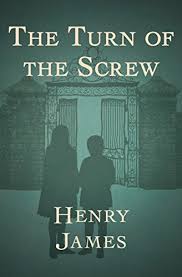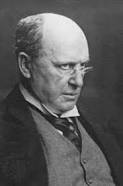The Turn of the Screw Page #5
The Turn of the Screw is an 1898 horror novella by Henry James that first appeared in serial format in Collier's Weekly magazine. In October 1898 it appeared in The Two Magics, a book published by Macmillan in New York City and Heinemann in London.
Nonetheless, the rest of the day I watched for further occasion to approach my colleague, especially as, toward evening, I began to fancy she rather sought to avoid me. I overtook her, I remember, on the staircase; we went down together, and at the bottom I detained her, holding her there with a hand on her arm. “I take what you said to me at noon as a declaration that you’ve never known him to be bad.” She threw back her head; she had clearly, by this time, and very honestly, adopted an attitude. “Oh, never known him—I don’t pretend that!” I was upset again. “Then you have known him—?” “Yes indeed, miss, thank God!” On reflection I accepted this. “You mean that a boy who never is—?” “Is no boy for me!” I held her tighter. “You like them with the spirit to be naughty?” Then, keeping pace with her answer, “So do I!” I eagerly brought out. “But not to the degree to contaminate—” “To contaminate?”—my big word left her at a loss. I explained it. “To corrupt.” She stared, taking my meaning in; but it produced in her an odd laugh. “Are you afraid he’ll corrupt you?” She put the question with such a fine bold humor that, with a laugh, a little silly doubtless, to match her own, I gave way for the time to the apprehension of ridicule. But the next day, as the hour for my drive approached, I cropped up in another place. “What was the lady who was here before?” “The last governess? She was also young and pretty—almost as young and almost as pretty, miss, even as you.” “Ah, then, I hope her youth and her beauty helped her!” I recollect throwing off. “He seems to like us young and pretty!” “Oh, he did,” Mrs. Grose assented: “it was the way he liked everyone!” She had no sooner spoken indeed than she caught herself up. “I mean that’s his way—the master’s.” I was struck. “But of whom did you speak first?” She looked blank, but she colored. “Why, of him.” “Of the master?” “Of who else?” There was so obviously no one else that the next moment I had lost my impression of her having accidentally said more than she meant; and I merely asked what I wanted to know. “Did she see anything in the boy—?” “That wasn’t right? She never told me.” I had a scruple, but I overcame it. “Was she careful—particular?” Mrs. Grose appeared to try to be conscientious. “About some things—yes.” “But not about all?” Again she considered. “Well, miss—she’s gone. I won’t tell tales.” “I quite understand your feeling,” I hastened to reply; but I thought it, after an instant, not opposed to this concession to pursue: “Did she die here?” “No—she went off.” I don’t know what there was in this brevity of Mrs. Grose’s that struck me as ambiguous. “Went off to die?” Mrs. Grose looked straight out of the window, but I felt that, hypothetically, I had a right to know what young persons engaged for Bly were expected to do. “She was taken ill, you mean, and went home?” “She was not taken ill, so far as appeared, in this house. She left it, at the end of the year, to go home, as she said, for a short holiday, to which the time she had put in had certainly given her a right. We had then a young woman—a nursemaid who had stayed on and who was a good girl and clever; and she took the children altogether for the interval. But our young lady never came back, and at the very moment I was expecting her I heard from the master that she was dead.” I turned this over. “But of what?” “He never told me! But please, miss,” said Mrs. Grose, “I must get to my work.” III Her thus turning her back on me was fortunately not, for my just preoccupations, a snub that could check the growth of our mutual esteem. We met, after I had brought home little Miles, more intimately than ever on the ground of my stupefaction, my general emotion: so monstrous was I then ready to pronounce it that such a child as had now been revealed to me should be under an interdict. I was a little late on the scene, and I felt, as he stood wistfully looking out for me before the door of the inn at which the coach had put him down, that I had seen him, on the instant, without and within, in the great glow of freshness, the same positive fragrance of purity, in which I had, from the first moment, seen his little sister. He was incredibly beautiful, and Mrs. Grose had put her finger on it: everything but a sort of passion of tenderness for him was swept away by his presence. What I then and there took him to my heart for was something divine that I have never found to the same degree in any child—his indescribable little air of knowing nothing in the world but love. It would have been impossible to carry a bad name with a greater sweetness of innocence, and by the time I had got back to Bly with him I remained merely bewildered—so far, that is, as I was not outraged—by the sense of the horrible letter locked up in my room, in a drawer. As soon as I could compass a private word with Mrs. Grose I declared to her that it was grotesque. She promptly understood me. “You mean the cruel charge—?” “It doesn’t live an instant. My dear woman, look at him!” She smiled at my pretention to have discovered his charm. “I assure you, miss, I do nothing else! What will you say, then?” she immediately added. “In answer to the letter?” I had made up my mind. “Nothing.” “And to his uncle?” I was incisive. “Nothing.” “And to the boy himself?” I was wonderful. “Nothing.” She gave with her apron a great wipe to her mouth. “Then I’ll stand by you. We’ll see it out.” “We’ll see it out!” I ardently echoed, giving her my hand to make it a vow. She held me there a moment, then whisked up her apron again with her detached hand. “Would you mind, miss, if I used the freedom—” “To kiss me? No!” I took the good creature in my arms and, after we had embraced like sisters, felt still more fortified and indignant. This, at all events, was for the time: a time so full that, as I recall the way it went, it reminds me of all the art I now need to make it a little distinct. What I look back at with amazement is the situation I accepted. I had undertaken, with my companion, to see it out, and I was under a charm, apparently, that could smooth away the extent and the far and difficult connections of such an effort. I was lifted aloft on a great wave of infatuation and pity. I found it simple, in my ignorance, my confusion, and perhaps my conceit, to assume that I could deal with a boy whose education for the world was all on the point of beginning. I am unable even to remember at this day what proposal I framed for the end of his holidays and the resumption of his studies. Lessons with me, indeed, that charming summer, we all had a theory that he was to have; but I now feel that, for weeks, the lessons must have been rather my own. I learned something—at first, certainly—that had not been one of the teachings of my small, smothered life; learned to be amused, and even amusing, and not to think for the morrow. It was the first time, in a manner, that I had known space and air and freedom, all the music of summer and all the mystery of nature. And then there was consideration—and consideration was sweet. Oh, it was a trap—not designed, but deep—to my imagination, to my delicacy, perhaps to my vanity; to whatever, in me, was most excitable. The best way to picture it all is to say that I was off my guard. They gave me so little trouble—they were of a gentleness so extraordinary. I used to speculate—but even this with a dim disconnectedness—as to how the rough future (for all futures are rough!) would handle them and might bruise them. They had the bloom of health and happiness; and yet, as if I had been in charge of a pair of little grandees, of princes of the blood, for whom everything, to be right, would have to be enclosed and protected, the only form that, in my fancy, the afteryears could take for them was that of a romantic, a really royal extension of the garden and the park. It may be, of course, above all, that what suddenly broke into this gives the previous time a charm of stillness—that hush in which something gathers or crouches. The change was actually like the spring of a beast.
Translation
Translate and read this book in other languages:
Select another language:
- - Select -
- 简体中文 (Chinese - Simplified)
- 繁體中文 (Chinese - Traditional)
- Español (Spanish)
- Esperanto (Esperanto)
- 日本語 (Japanese)
- Português (Portuguese)
- Deutsch (German)
- العربية (Arabic)
- Français (French)
- Русский (Russian)
- ಕನ್ನಡ (Kannada)
- 한국어 (Korean)
- עברית (Hebrew)
- Gaeilge (Irish)
- Українська (Ukrainian)
- اردو (Urdu)
- Magyar (Hungarian)
- मानक हिन्दी (Hindi)
- Indonesia (Indonesian)
- Italiano (Italian)
- தமிழ் (Tamil)
- Türkçe (Turkish)
- తెలుగు (Telugu)
- ภาษาไทย (Thai)
- Tiếng Việt (Vietnamese)
- Čeština (Czech)
- Polski (Polish)
- Bahasa Indonesia (Indonesian)
- Românește (Romanian)
- Nederlands (Dutch)
- Ελληνικά (Greek)
- Latinum (Latin)
- Svenska (Swedish)
- Dansk (Danish)
- Suomi (Finnish)
- فارسی (Persian)
- ייִדיש (Yiddish)
- հայերեն (Armenian)
- Norsk (Norwegian)
- English (English)
Citation
Use the citation below to add this book to your bibliography:
Style:MLAChicagoAPA
"The Turn of the Screw Books." Literature.com. STANDS4 LLC, 2025. Web. 6 Mar. 2025. <https://www.literature.com/book/the_turn_of_the_screw_330>.








Discuss this The Turn of the Screw book with the community:
Report Comment
We're doing our best to make sure our content is useful, accurate and safe.
If by any chance you spot an inappropriate comment while navigating through our website please use this form to let us know, and we'll take care of it shortly.
Attachment
You need to be logged in to favorite.
Log In